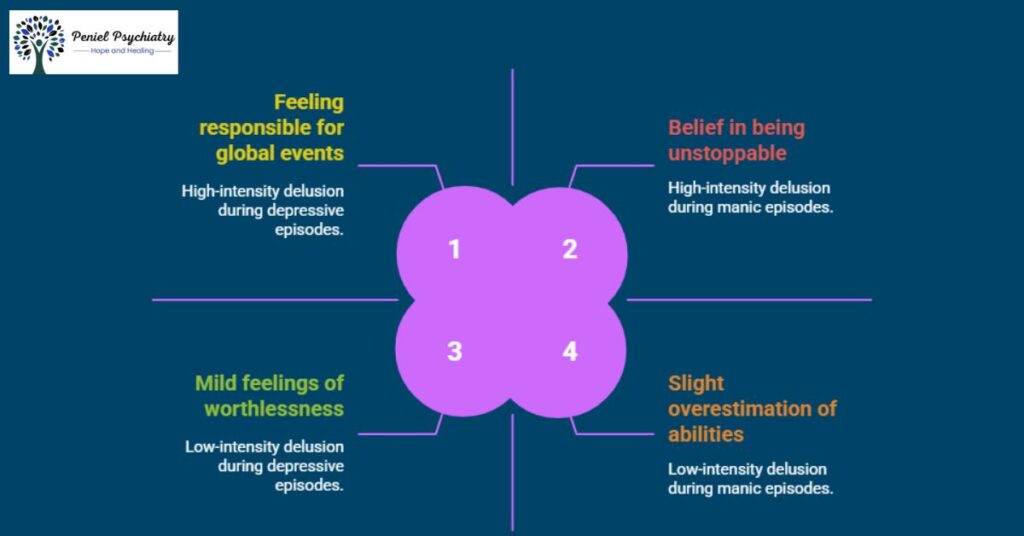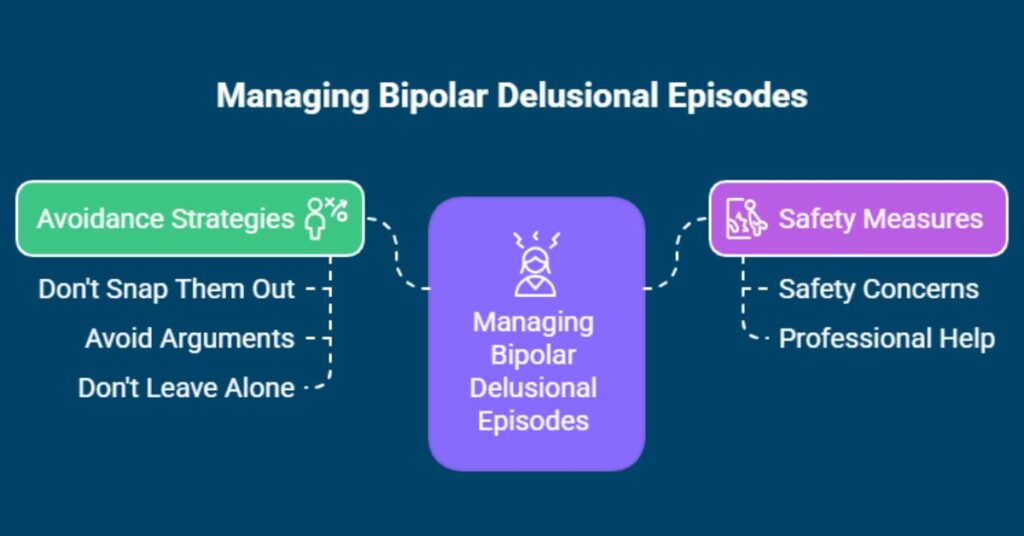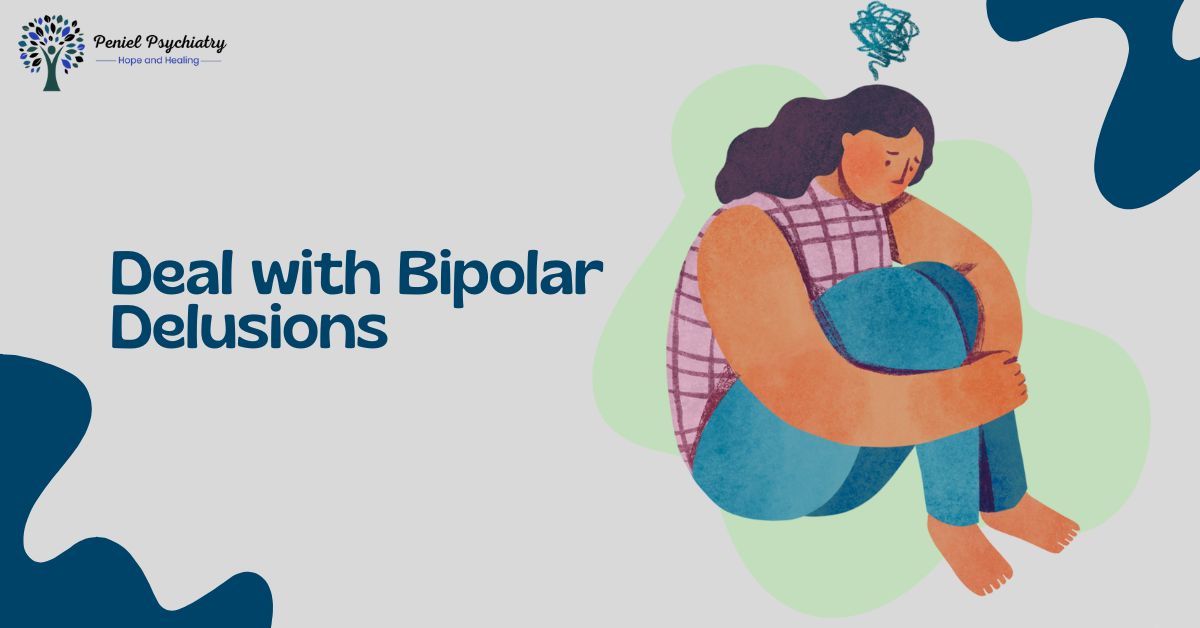How to deal with bipolar delusions is a question many people ask. These delusions can happen during manic or low moods. They often involve false thoughts, such as feeling too powerful or believing others are out to get you. To the person affected, these ideas seem real.
That makes them difficult to spot or discuss. It’s important to know what they look like. It also helps to understand why they happen and how to respond with care. Whether the delusions sound big or scary, support is possible. The right help can calm the situation, guide recovery, and improve the lives of everyone involved.
What Are Bipolar Delusions?
Bipolar delusions are strong false beliefs that don’t match reality. These often show up during a manic or depressive phase of bipolar disorder. They can make someone believe things that are not true, like having special powers or thinking others are against them. These thoughts feel real to the person.
What Exactly Are Bipolar Delusions?
A bipolar delusion is not just a random thought. It’s a strong belief that stays even when there’s proof it’s not true. These delusions are part of what doctors call bipolar psychosis. They often appear during extreme mood swings, either during a high (mania) or a low (depression).
People going through bipolar delusional episodes may fully believe in things that don’t make sense to others. These beliefs aren’t just ideas; they feel like facts to the person affected.
Common Types of Bipolar Delusions
There are a few common types:
- Grandiose delusions: The person may think they have superpowers, great wealth, or a critical mission.
- Paranoid delusions: They may feel watched, followed, or believe others want to hurt them.
- Mixed delusions: A blend of ideas that may shift or overlap.
These types of bipolar delusions can shift with each episode, depending on the mood phase, manic, depressive, or mixed, making each experience different.
How Are Delusions Different From Hallucinations?
A delusion is a false belief. A hallucination is when someone sees, hears, or feels things that aren’t real. Both can happen in bipolar disorder and delusions, but they’re not the same. Knowing the difference can help you spot the symptoms and receive the proper care.
Why Do Delusions Happen in Bipolar Disorder?
Delusions in bipolar disorder usually happen during intense mood episodes. The brain’s chemicals shift, thinking becomes unclear, and the person may lose touch with reality. These delusions often appear during mania or deep depression. This is part of bipolar psychosis and can make daily life confusing and risky for the person.

What Causes Delusions in Bipolar Disorder?
Bipolar disorder affects how the brain handles mood, thoughts, and reality. When someone is in a manic or depressive state, the brain can misfire. It may send the wrong signals. This can lead to bipolar delusional episodes, where false beliefs feel entirely true.
In a manic episode, a person may believe they are famous or unstoppable. In depression, they may feel something terrible is about to happen or that they are to blame for events far beyond their control. These delusions don’t come from stress or imagination; they come from fundamental changes in the brain.
The Role of Mood Episodes
Delusions often go hand-in-hand with extreme highs (mania) or deep lows (depression). During mania, the brain speeds up. Thoughts race. Reality gets blurred. In depression, the brain slows down. Thinking becomes dark and heavy. Both states can trigger bipolar disorder and delusions.
Is This a Type of Psychosis?
Yes. When bipolar symptoms include delusions, it’s called bipolar psychosis. It’s a serious condition, but it can be treated. With proper care, many individuals can effectively manage these symptoms and resume a stable life.
Early Warning Signs to Watch For
Noticing early signs of bipolar delusions can help get the right help sooner. Changes in behavior, mood, or speech might mean a delusional episode is starting. Watching for these signs during manic or depressive phases is key to support and safety.
Changes in Behavior or Speech
People with bipolar disorder may suddenly act very differently. They might talk faster or slower, say strange things, or seem confused. Sometimes, they become very suspicious or overly confident. These shifts can be clues that a bipolar delusional episode is beginning.
Feeling Paranoid or Overly Confident
Paranoia means feeling like others want to harm or watch you. On the other hand, grandiose delusions make someone feel extremely important or influential. Both feelings are common in bipolar psychosis and should not be ignored.
Pulling Away from Friends and Family
When someone starts believing things that aren’t true, they might stop trusting those closest to them. They could avoid friends, miss appointments, or act in a secretive manner. This withdrawal is a warning sign that delusions might be growing.
Why Early Detection Matters
Catching these signs early helps get medical care before things get worse. It can reduce risks and make treatment more effective. Family and friends play a significant role by noticing changes and gently encouraging help.
What to Do if Someone You Love Is Having Delusions
Seeing a loved one experience bipolar delusions can be complex. Knowing how to respond can make a big difference. Staying calm, listening without judgment, and gently guiding them toward help is key. This support helps them feel safer and more understood during challenging moments.
Stay Calm and Don’t Argue
When someone has delusions, arguing about what’s true can make things worse. They genuinely believe their thoughts, so trying to prove them wrong can cause frustration or anger. Staying calm and patient shows you care and helps keep the situation peaceful.
Avoid Challenging the Delusions Directly
It’s better not to confront or question the false beliefs head-on. Instead, focus on how the person feels and what they need. For example, say things like, “I’m here for you,” or “Let’s talk about what’s bothering you.” This builds trust.
Encourage Professional Help
Delusions are a severe symptom of bipolar disorder and often need treatment. Gently encourage your loved one to see a doctor or therapist. You can offer to help with appointments or find resources. Support like this can lead to better care and faster recovery.
Take Care of Your Wellbeing
Supporting someone with bipolar delusions can be stressful. Remember to look after yourself too. Talk to friends, seek advice, and set boundaries if needed. When you’re well, you can give better support.
Medical Treatment Options for Bipolar Delusions
Bipolar delusions often need medical care to get better. Treatments can include medication and therapy. These help balance the brain and manage symptoms. Early treatment can improve quality of life and reduce the chances of delusions returning.
Medication to Manage Delusions
Doctors often prescribe antipsychotic medicines to help reduce delusions. Mood stabilizers may also be used to keep mood swings under control. It’s essential that medications are taken as directed and changes occur only under a doctor’s supervision.
Therapy Helps Too
Talking therapies, like cognitive-behavioral therapy (CBT), can teach skills to handle delusional thoughts. Therapy also helps people recognize warning signs and cope better during episodes. Psychoeducation can support both patients and families in understanding the illness.
When Emergency Care Is Needed
Sometimes delusions can lead to risky behavior. In such cases, emergency medical assistance may be necessary to ensure the person’s safety. Hospitals and crisis teams have established protocols to stabilize the situation and provide immediate care.
Working With a Psychiatrist
A psychiatrist can create a tailored treatment plan. Regular check-ins help track progress and adjust care. Working closely with healthcare providers improves the chances of managing bipolar delusions successfully.
What You Should NOT Do During a Delusional Episode
When someone is having a bipolar delusional episode, specific actions can make things worse. Knowing what to avoid helps keep the person safe and calm. This section highlights common mistakes to avoid and offers guidance on how to handle situations more effectively.

Don’t Try to Snap Them Out of It
Delusions feel very real to the person. Trying to force them to “wake up” or see reality won’t work. It may only cause anger or fear. Instead, stay patient and supportive.
Avoid Arguments, Shouting, or Jokes
Arguing or raising your voice can increase stress. Joking about the delusions can feel hurtful or dismissive. Maintain a gentle and calm tone to avoid exacerbating the situation.
Don’t Ignore Safety Concerns
If the person talks about harming themselves or others, take it seriously. Seek professional help right away. Safety comes first.
Don’t Leave Them Alone if They’re at Risk
If delusions lead to unsafe behavior, stay with the person or get someone to help. Watching over them can prevent harm until help arrives.
Long-Term Support and Recovery Tips
Recovery from bipolar delusions takes time and care. Long-term support helps keep symptoms under control and improves daily life. Building trust, maintaining a routine, and staying connected with mental health care are essential steps toward lasting stability.
Build Trust and Routine
People with bipolar delusions need steady support. Being patient and listening helps build trust. A daily routine with set times for sleep, meals, and activities can bring stability and reduce the frequency of episodes.
Encourage Regular Mental Health Care
Keeping appointments with doctors and therapists helps manage bipolar symptoms. Medication and therapy are most effective when followed consistently and regularly. This ongoing care lowers the chance of new delusional episodes.
Join Support Groups
Talking with others who understand bipolar disorder can be comforting. Support groups provide a shared experience, offer advice, and create a safe space for expressing feelings. This connection can reduce isolation.
Stay Alert for Warning Signs
Even in recovery, it’s essential to watch for signs of returning delusions. Early action can prevent bigger problems. Family and friends play a crucial role in recognizing changes and facilitating prompt care.
When to Get Professional Help
Knowing when to seek professional help is key for managing bipolar delusions. If delusions last too long, worsen, or cause safety concerns, it’s time to get support from doctors or emergency services. Early help can protect health and improve recovery chances.
Signs You Need Immediate Help
If someone talks about hurting themselves or others, or shows dangerous behavior, call emergency services right away. Safety is the top priority.
When Delusions Don’t Go Away
Sometimes delusions last beyond a mood episode or keep coming back. If this happens, contact a psychiatrist for a complete evaluation and updated treatment.
How to Reach Out for Help
Contact your mental health provider, a local clinic, or a crisis helpline. If you’re unsure, family members or friends can assist you in making appointments or finding resources.
Using Peniel Psychiatry for Support
Peniel Psychiatry offers specialized care for bipolar disorder and psychosis. Their experts provide personalized treatment plans to manage delusions and improve quality of life. Getting help early from professionals can make all the difference.
Frequently Asked Questions (FAQs)
Can bipolar disorder cause delusions?
Yes. Bipolar disorder can lead to delusions, especially during manic or depressive episodes. This is called bipolar psychosis.
How long do bipolar delusions last?
The length varies. Some delusions last days, others weeks, depending on treatment and mood episode severity.
How do you calm someone having delusions?
Stay calm, avoid arguing, listen carefully, and encourage professional help. Patience and support are key.
Is it possible to recover from bipolar psychosis?
Yes. With proper medication, therapy, and support, many people recover well and manage their symptoms in the long term.
What’s the difference between a delusion and a hallucination?
Delusions are false beliefs; hallucinations involve seeing or hearing things that aren’t there. Both can occur in bipolar disorder.
Final Thoughts
Bipolar delusions can be confusing and complicated to handle for both the person going through them and their loved ones. But these delusions are part of a treatable condition. With the proper support, care, and patience, individuals can effectively manage their symptoms and lead fulfilling lives.
Understanding the signs and knowing how to respond makes a big difference. Remember, professional help is always available, and recovery is possible. You don’t have to face bipolar delusions alone.




